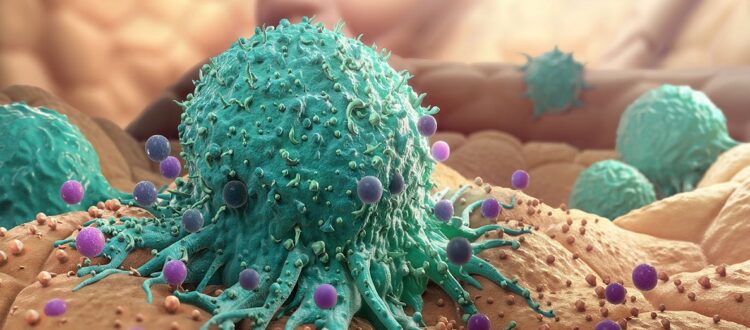Cancer Patients Continue To Die With Little Or No Treatment

Despite efforts by the government and the private sector to reduce cancer mortality in Nigeria through the Cancer Health Fund (CHF), indigent Nigerians continue to suffer and die from cancer due to high cost of treatment as only 20 patients have benefited from the fund since inception.
This is even as the dearth of oncologists pose a threat to cancer treatment in the country as experts express worry that the cost of treatment and dearth of oncologists could mar the efforts of the government in tackling the cancer scourge in the country.
The Cancer Health Fund (CHF) programme was established through advocacy by some private institutions to the federal government to set up a special fund initially called catastrophe fund.
The programme commenced in 2021 with six pilot health facilities namely; the Ahmadu Bello University Teaching Hospital, National Hospital Abuja, University of Benin Teaching Hospital, Federal Teaching Hospital Gombe, University of Nigeria Teaching Hospital, and the University College Hospital, Ibadan.
The federal government and the private sector were supposed to contribute funds to the CHF for indigent cancer patients.
However, LEADERSHIP Sunday learnt that the federal government alone has been contributing to the fund and has contributed about $4 million since inception.
The acting director, Cancer Prevention and Control, National Institute for Cancer Research and Treatment (NICRAT), Dr Usman Waziri, told LEADERSHIP Sunday that one of the major challenges of CHF was the inability to mobilise the private sector as well as some other donor agencies, international partners and philanthropists to contribute their quota.
He said since inception, the government has actually sustained the programme by injecting funds into the CHF on a yearly basis. “However, the contribution from the private sector has not been forthcoming,” he hinted.
He said since inception, an equivalent of about $4 million has been contributed by the federal government towards the fund, stating that the fund was still at a pilot stage that ought to have been scaled up.
“As of this year, over 2,000 patients were able to access the platform to apply. Out of it, over 720 have been screened while about 20 benefited since inception. We will not say the number is optimal, we would rather say it is suboptimal,” he said.
Meanwhile, out of frantic efforts to mitigate the effect of cancer in the country, the federal government came up with the establishment of NICRAT. An act for the establishment of NICRAT was passed by the 9th Assembly in 2017, but the agency came into being in January 2023.
Presently, the federal government has directed the transfer of the implementation of CHF from the Federal Ministry of Health to NICRAT.
Usman said efforts were already in place for the reviewing of the entire process of CHF implementation and expanding the scope of activities, adding that the fund was primarily meant to tackle breast cancer, cervical cancer and prostate cancer.
However, the cancer burden continues to grow exponentially, exerting tremendous physical, emotional and financial strains on individuals, families and communities.
The World Health Organisation (WHO) said that cancer kills 240 Nigerians daily, meaning 10 Nigerians die every hour from cancer. The global health body revealed that cervical cancer kills about 24 Nigerian women daily; prostate cancer kills about 26 Nigerian men daily and breast cancer kills about 40 Nigerians daily.
Stakeholders have attributed the rate of death from cancer in the country to inadequate specialists, radiotherapy machines and high cost of treatment. They also said that the number of oncologists in the country were very few, saying that the country currently has about 80 oncologists serving a population of over 200 million.
They therefore, stressed the need for governments at all levels to address the huge deficit in the number of functional cancer treatment centres and the number of oncologists in the country.
Nigeria is now grappling with a shortage of medical professionals, with less than 100 oncologists to care for the nations approximately 200 million residents.
Out of an approximately 200 million population, 102,000 new instances of cancer are diagnosed in Nigeria every year, with an estimated 72,000 cancer-related deaths recorded annually.
Medical professionals who spoke with LEADERSHIP Sunday lamented the dearth of oncologists in the country, even as they called on the federal government to stem brain drain in the health sector.
Consultant radiation and oncologist, Dr Adeoluwa Adeniji, averred that while more cancer cases are diagnosed, survival rate is less than 50 percent. “For instance, if we pick up 100 cancer cases, 50 percent or less of the patients would survive, unlike the western world where the survival rate is very high,” he stated.
The reason for this is not far-fetched, as many Nigerians present themselves late and there are less than 100 oncologists on ground to attend to them due to brain drain. “Worse still, most of the oncologists are situated in Lagos and Abuja. For instance, there is only one oncologist in Port Harcourt, Nigeria,” he disclosed.
The oncologist urged the Nigerian government to establish a welcoming atmosphere for medical professionals to remain, as many are being lured by the prospect of better living conditions outside. “The government needs to allocate more funds to the health sector. Every oncologists goal is to see a cancer patient live and have a normal life. Government should make salaries more competitive and the government must make sure that medical professionals have access to necessary equipment,” he said.
Nigerians should prioritise routine examinations more, the medical director of Pinecrest Specialist Hospital, Dr
Omadeli Boyo told LEADERSHIP Sunday stressing that early detection of cancer is crucial for survival. “Given that there are less than 100 oncologists in Nigeria, it is important for Nigerians to prioritise routine cancer screening and timely treatment for those who are diagnosed with the disease. In order to lessen the financial burden of cancer treatment, I would also implore Nigerias few oncologists to share their expertise by instructing other medical professionals,” Boyo advised.
To cushion the effect of brain drain in Nigeria, the chief clinical oncologist, Nigeria Sovereign Investment Authority, and Lagos University Teaching Hospital, Idi-Araba, Cancer Centre (NSIA-LUTH Cancer Centre), Prof Francis Durosinmi-Etti, recommended the deployment of Artificial Intelligence (AI) in the health sector.
Durosinmi-Etti, in an interview with LEADERSHIP Sunday, maintained that cancer treatment has improved in recent time, as the federal government has set up more cancer treatment centres across Nigeria, which is being complemented with private cancer centres.
However, the cost of treatment and dearth of oncologists could mar the efforts of government in tackling the cancer scourge in the country, the chief clinical oncologist asserted, adding that, “only radiotherapy treatment for about five weeks for stage one cancer, could cost up to N1.5 million. If you have to add scans, drugs and other interventions to it, then you should be looking at N3 vmillion to N4 million.”
To expedite cancer treatment, Durosinmi-Etti suggested using AI, even as he revealed that LUTH had already deployed AI for the treatment of cancer.
“For example, a cancer patients surgery takes hours to prepare, but with AI, it just takes a few minutes to complete. For me, and for those of us in Nigeria and other areas of the world, the advancement of AI is of utmost importance. Its current application in the realm of cancer, especially in radiation oncology, is what makes it so beautiful.
“I had mentioned that we lack physicians and specialists. However, a really excellent oncologist will take at least two hours, if not more, to treat organs at risk during cancer treatment.
“The doctor can complete that task in five minutes with AI. Furthermore, it performs tasks that physicians are unable to. AI also gives you operating instructions for the devices. Following therapy, AI does whats known as a treatment plan evaluation to assist you in assessing your performance. Additionally, you may receive a report once the course of treatment is complete. You are given a dosage volume histogram, which is a therapy analysis in graphical form. You can accomplish tasks more precisely and clearly with AI, and Im glad Nigeria has begun to use it as well. I implore other medical facilities to do the same,” he further disclosed.
Speaking on what the federal government is doing to tackle the cancer scourge, the centre director, NSIA-LUTH Cancer Centre, Dr Lilian Ekpo revealed that the federal government, through the NSIA-LUTH Cancer Centre, has successfully undertaken over 6,231 chemotherapy treatments, 3,997 radiotherapy treatments and 97 brachytherapy treatments since May 29, 2019 when it commenced operation.
“At NSIA-LUTH, we also have two radiotherapy wings containing two Varian vital beam linear accelerators and one Varian Halcyon linear accelerator; two chemotherapy suites; one General Electric CT Simulator; one C-Arm Machine and Ultrasound machines. We are the first centre to offer world standard curative 3-dimensional high dose rate brachytherapy for gynaecological cancers in Nigeria and West Africa.
“The first centre in West Africa with stereotactic body radiotherapy and stereotactic ablative radiotherapy capability and the first centre in West Africa with a fully staffed and expert-trained pediatric radiation oncology unit with over 200 children treatment,” she disclosed.
From all indications, Ekpo averred that the federal government in partnership with NSIA has done well in tackling cancer in the country, but advocated for the full enforcement of the National Health Insurance Act (NHIA) which ensures that all Nigerians have insurance coverage.
“That way, more Nigerians would go for routine screening and we will pick cases at an early stage, because at stage one for instance, there is over 95 per cent survival rate,” she added.
She also called on Nigerians to prevent cancer by adopting lifestyles that can prevent its occurrence: going for regular screening with a view to detecting it early if it occurs and getting treatment on time when diagnosed with the condition.
